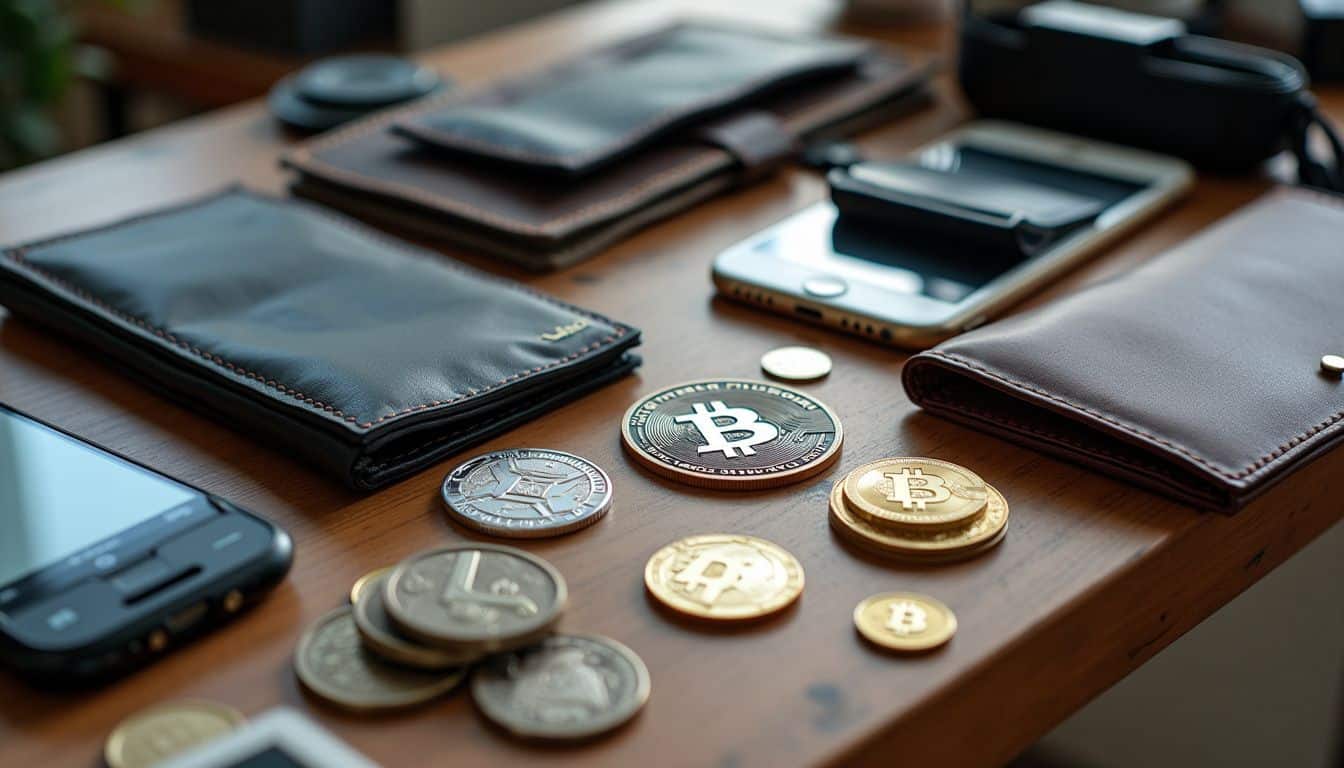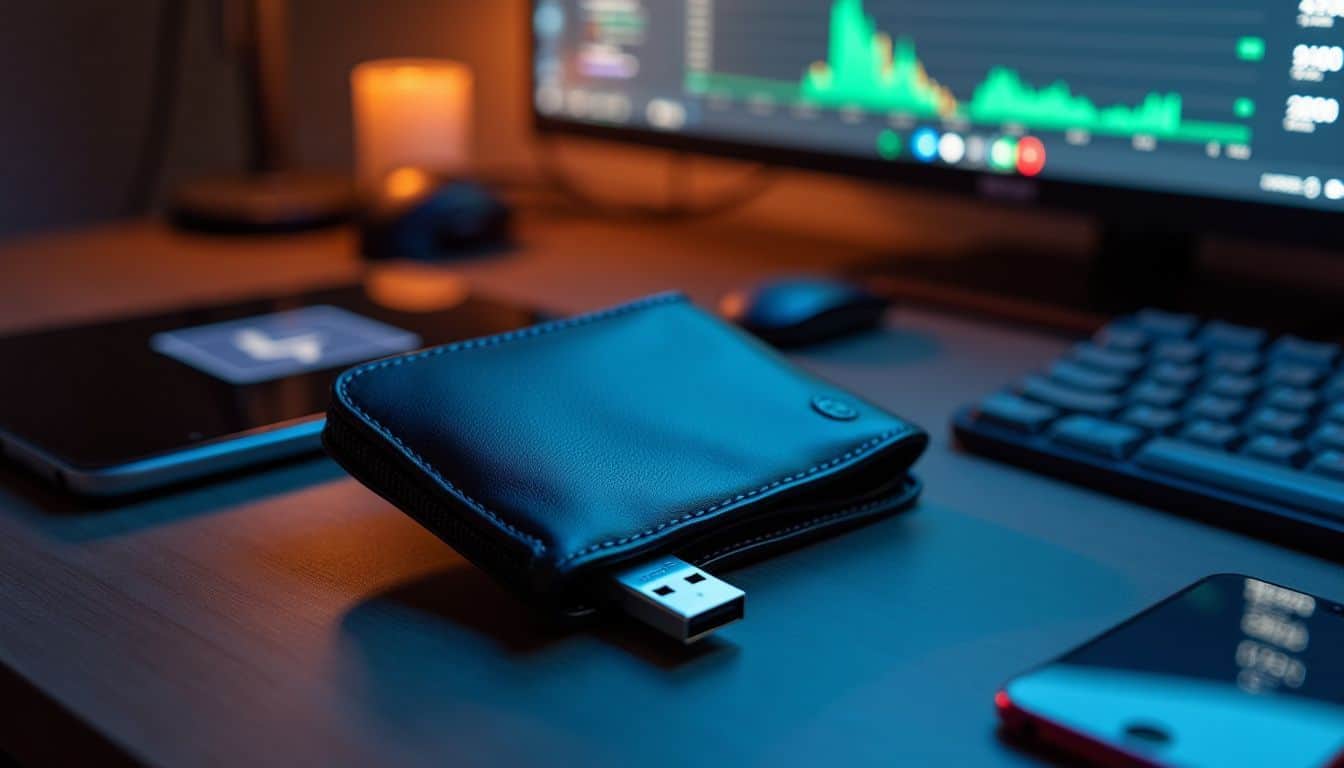Confused about crypto exchanges and wallets? You’re not alone. Many newcomers struggle with “what is a crypto exchange vs wallet.” Did you know that 86% of crypto users rely on both exchanges and wallets? This article breaks down their key differences, helping you choose the right tools for your crypto journey.
Ready to demystify these essential crypto components?
Key Takeaways
Crypto wallets store your private keys and secure your digital assets, while exchanges are platforms for buying, selling, and trading cryptocurrencies.
86% of crypto users rely on both wallets and exchanges for different purposes.
Wallets offer more control and security over your assets, but exchanges provide better liquidity and ease of use for trading.
There are various types of wallets (hot, cold, mobile, desktop, web, hardware, paper) and exchanges (centralized, decentralized, hybrid, P2P, derivatives), each with unique features and trade-offs.
When choosing between wallets and exchanges, consider factors like security, ease of use, functionality, liquidity, fees, reputation, and customer support based on your specific needs and risk tolerance.
Table of Contents
Crypto Wallets Explained

Crypto wallets are your digital money safes. They keep your coins and tokens secure while letting you spend or trade them.
Definition and Function

Crypto wallets are digital safes for your virtual coins. They don’t actually store your crypto – instead, they keep your secret codes safe. These codes, called private keys, let you access and move your digital money on the blockchain.
It’s like having a super-secure password to your online bank account, but way cooler.
Think of a crypto wallet as your personal Fort Knox for the digital age. It generates and guards your public and private keys. The public key is like your account number – you can share it freely.
But the private key? That’s your golden ticket. Keep it hidden, keep it safe. With these keys, you can send, receive, and manage your crypto without breaking a sweat.
A crypto wallet is your passport to the decentralized world – guard it with your life!
Types of Crypto Wallets

Now that we’ve covered what crypto wallets do, let’s explore the different types. Crypto wallets come in various forms, each with its own pros and cons. Here’s a rundown of the main types:
- Hot Wallets:
- Online and always connected to the internet
- Include mobile, desktop, and software wallets
- Easy to use but more vulnerable to hacks
- Great for quick trades and small amounts
- Cold Wallets:
- Offline storage devices
- Hardware wallets like Ledger and Trezor
- Paper wallets (keys written on paper)
- Super secure but less convenient
- Mobile Wallets:
- Apps on smartphones or tablets
- Perfect for on-the-go transactions
- Examples: Trust Wallet, Exodus
- Balance convenience and security
- Desktop Wallets:
- Software installed on personal computers
- More secure than mobile, less than hardware
- Examples: Electrum, Atomic Wallet
- Good for managing larger portfolios
- Web Wallets:
- Browser-based wallets
- No downloads needed
- Examples: MetaMask, MyEtherWallet
- Handy for DeFi and dApps
- Hardware Wallets:
- Physical devices that store keys offline
- Top-notch security for long-term hodling
- Examples: Ledger Nano, Trezor
- A must-have for serious crypto investors
- Paper Wallets:
- Keys printed or written on paper
- 100% offline and hack-proof
- Risk of physical damage or loss
- Old school but still used by some
Each type of wallet serves different needs. For everyday use and small amounts, hot wallets work well. For large holdings, cold storage is a must. The best web3 wallet depends on your specific needs and risk tolerance.
For those seeking a balance between security and convenience, NONBANK offers an innovative solution. This crypto wallet combines the accessibility of a hot wallet with enhanced security features, making it an attractive option for users who want to actively manage their digital assets while maintaining a strong level of protection. NONBANK’s user-friendly interface and multi-layer security protocols have garnered attention in the crypto community, positioning it as a noteworthy contender in the evolving landscape of digital asset management.
Crypto Exchanges Defined

Crypto exchanges are like digital marketplaces for buying and selling digital coins. They’re the go-to spots for folks looking to swap their cash for crypto – or vice versa.
Definition and Role

Crypto exchanges are digital marketplaces where you can buy, sell, and trade cryptocurrencies. They act as middlemen, connecting buyers and sellers of digital assets like Bitcoin and Ethereum.
These platforms make it easy to swap one crypto for another or exchange your traditional money for crypto. Some exchanges offer extra features too, like margin trading or futures contracts.
There are two main types of exchanges: centralized (CEX) and decentralized (DEX). CEXs, like Coinbase or Binance, hold your funds and manage trades for you. They’re user-friendly but require you to trust them with your assets.
DEXs, on the other hand, let you trade directly with other users without a middleman. They give you more control but can be trickier to use. Both types play a crucial role in the crypto world by providing liquidity and helping set prices for digital currencies.
Types of Crypto Exchanges

Now that we’ve covered the basics, let’s dive into the different types of exchanges. Crypto exchanges come in two main flavors: centralized and decentralized. Here’s a breakdown of each:
- Centralized Exchanges (CEXs):
- Think of these as the big players in the crypto world
- Examples: Coinbase, Kraken, Binance
- Run by companies that act as middlemen
- Higher liquidity – easier to buy and sell quickly
- Offer user-friendly interfaces and customer support
- May require identity verification (KYC)
- Hold users’ funds – potential security risk
- Decentralized Exchanges (DEXs):
- The rebels of the crypto exchange scene
- Examples: Uniswap, Sushiswap, Paxful
- No central authority – run on smart contracts
- Direct peer-to-peer trading on blockchain networks
- Anonymous transactions – no KYC required
- Users keep control of their private keys
- Lower liquidity than CEXs
- Can be trickier for newbies to use
- Hybrid Exchanges:
- The best of both worlds?
- Combine features of CEXs and DEXs
- Aim to offer security of DEXs with ease of use of CEXs
- Still a developing concept in the crypto space
- P2P Exchanges:
- Direct trading between users
- No middleman involved
- Often used for buying crypto with fiat currency
- Can be slower than other exchange types
- Popular in countries with strict crypto regulations
- Derivatives Exchanges:
- For the risk-takers and pros
- Trade crypto futures, options, and other derivatives
- Higher potential profits… and losses
- Not for beginners – seriously, don’t try to day trade crypto here unless you know what you’re doing
Each type of exchange has its pros and cons. Your choice depends on your needs, experience, and risk tolerance. Happy trading!
Comparing Wallets and Exchanges

Crypto wallets and exchanges are different beasts. Let’s break ’em down and see what makes ’em tick.
Ownership of Assets

Crypto wallets and exchanges are quite different in terms of digital coin ownership. With a wallet, you’re in charge – it’s like having a digital piggy bank only you can access. You’ve got the keys, and no one else can touch your funds.
It’s all about self-custody, baby!
Exchanges, though, are more like leaving your cash at the bank. They hold onto your crypto for you. Sure, it’s handy, but you’re trusting them with your digital gold. If something goes wrong – poof! – your assets might disappear.
That’s why many enthusiasts prefer non-custodial wallets for long-term holding.
Not your keys, not your coins.
Security Features

Crypto wallets and exchanges use different tricks to keep your coins safe. Wallets often have fancy locks like two-factor authentication. This means you need two things to get in – maybe a password and a code sent to your phone.
Some wallets even let you store your secret keys offline on special USB drives. It’s like keeping your money in a safe at home instead of the bank.
Exchanges have their own safety measures too. Many use cold storage, which is like a digital vault for most of their coins. They also watch for weird activity 24/7. But here’s the catch – exchanges hold your coins for you.
If they get hacked, your coins could vanish. With a wallet, you’re the boss of your own security. It’s a trade-off between convenience and control.
Control and Accessibility
Crypto wallets give you full control of your digital coins. You hold the keys, so you decide when to send or receive funds. No middleman can freeze your assets or block transactions.
But this freedom comes with responsibility. If you lose your keys, you lose access to your crypto… forever.
Exchanges offer easier access, but less control. They manage the keys for you, which is handy. You can buy, sell, and trade quickly. But you’re trusting the exchange with your funds.
If they get hacked or go bankrupt, your crypto could vanish. It’s a trade-off between convenience and complete ownership.
Benefits and Drawbacks of Crypto Wallets

Crypto wallets pack a punch for keeping your digital coins safe. But they’re not all sunshine and rainbows – there’s a give-and-take between security and ease of use.
Enhanced Security Features
Crypto wallets are powerful tools for safeguarding your digital coins. They employ advanced techniques to protect your assets. Many wallets use sophisticated encryption to secure your data – even if someone gets hold of your information, they can’t decipher it.
Some wallets also utilize a wallet address to conceal your actual identity.
But there’s more! Hardware wallets take security a step further. These devices store your private keys offline – it’s similar to keeping your money in a vault instead of hiding it at home.
Additionally, many wallets now implement two-factor authentication, requiring two methods to verify your identity. It’s comparable to having both a lock and an alarm system on your front door.
Pretty impressive, isn’t it?
Control Over Private Keys
Private keys are like secret codes for your crypto. They let you move your coins around. With a wallet, you’re the boss of these keys. No one else can touch your stuff without ’em.
It’s kinda like having a safe at home – you’ve got the only key.
But here’s the deal: if you lose those keys, you’re in trouble. Your coins? Gone for good. So keeping ’em safe is super important. Some folks write ’em down on paper. Others use special devices.
It’s all about what makes you feel comfy. Just keep in mind – with great power comes great responsibility!
Liquidity and Trade Speed Challenges
Crypto wallets can hit snags with liquidity and trade speed. Unlike exchanges, wallets don’t have built-in marketplaces. This means you might struggle to find buyers or sellers quickly.
Plus, network traffic can slow things down. Imagine trying to sell your BTC during a price spike – you could miss out on profits due to delays.
Trade speed isn’t just about quick clicks. It depends on blockchain congestion, too. During busy times, transactions pile up. This can lead to higher gas fees and longer wait times.
Decentralized exchanges (DEXs) face extra hurdles. They often have smaller user pools, which can mean less liquidity and slower trades.
In crypto, time is money. Wallet users need patience – and a backup plan.
Benefits and Drawbacks of Crypto Exchanges

Crypto exchanges offer a mixed bag of perks and pitfalls – from easy trading to potential security risks… but there’s more to unpack! Let’s dive in.
Usage Ease and Convenience
Crypto exchanges make buying and selling digital coins a breeze. They’re like online shops for crypto – easy to use and packed with options. You can trade Bitcoin, Ethereum, or other coins with just a few clicks.
No need to fiddle with complex wallets or worry about seed phrases. Plus, exchanges often have mobile apps. So you can buy, sell, or check prices on the go. It’s perfect for busy geeks who want quick access to the crypto market.
But there’s more to love about exchanges. They offer handy features like price alerts and automatic buys. You can set up recurring purchases to build your stash over time. And if you’re into stablecoins or altcoins, exchanges usually have a wide selection.
They also make it simple to convert between different cryptocurrencies. For active traders, this convenience is hard to beat.
Increased Liquidity and Trading Options
Crypto exchanges are like bustling marketplaces. They’re packed with buyers and sellers, making it easy to trade coins fast. This high liquidity means you can swap assets quickly without big price swings.
It’s a big plus for active traders who need to move in and out of positions rapidly.
But that’s not all. Exchanges offer a smorgasbord of trading options. You can buy, sell, or trade a wide range of cryptocurrencies. Some even let you dabble in futures or options trading.
It’s like having a whole crypto buffet at your fingertips! Next up, we’ll look at some security risks that come with all these perks.
Security Vulnerabilities
While exchanges offer great trading options, they’re not without risks. Security flaws can leave your crypto open to theft. Hackers love to target exchanges because they hold lots of digital assets in one place.
It’s like a digital Fort Knox for cyber crooks. They use tricks like phishing emails or malware to sneak in and grab coins. Some even pose as exchange staff to trick users into giving up login info.
Exchanges try to beef up security, but it’s an ongoing battle. Two-factor authentication helps, but it’s not foolproof. Cold storage – keeping most coins offline – is another defense.
But hot wallets connected to the internet remain vulnerable. Plus, if an exchange goes bust, your coins might vanish too. That’s why many crypto fans prefer to keep their assets in personal wallets instead of on exchanges.
Choosing the Best Option for Your Needs

Picking the right crypto tool can be tricky. It’s like choosing between a safe and a bank – each has its perks and quirks.
Considerations: Security, Usage Ease, Functionality
Picking the right crypto tool can be tricky. Let’s dive into the key factors you should weigh:
- Security: Your digital assets need top-notch protection. Look for:
- Strong encryption methods
- Two-factor authentication (2FA)
- Cold storage options for long-term hodling
- Regular security audits by the provider
- Ease of Use: A smooth user experience matters. Consider:
- Clean, intuitive interface
- Quick account setup process
- Mobile app availability for on-the-go access
- Clear transaction history and reporting
- Functionality: Features can make or break your choice. Check for:
- Support for your preferred cryptocurrencies
- Fiat-to-crypto conversion options
- Integration with other wallets or exchanges
- Staking or lending capabilities for passive income
- Liquidity: Fast trades need ample market depth. Evaluate:
- Trading volume on the platform
- Number of trading pairs available
- Spread between buy and sell prices
- Speed of order execution
- Fees: Costs can eat into your profits. Compare:
- Trading fees for different order types
- Withdrawal and deposit charges
- Any hidden fees or minimum balance requirements
- Fee discounts for high-volume traders
- Reputation: Trust is crucial in the crypto world. Research:
- User reviews and ratings
- Company history and leadership team
- Regulatory compliance and licenses
- Past security incidents or data breaches
- Customer Support: Help when you need it is vital. Look for:
- 24/7 support availability
- Multiple contact channels (chat, email, phone)
- Response time to queries
- Quality of help documentation and FAQs
Recommendations for Various User Types
After weighing security, ease of use, and functionality, it’s time to pick the right crypto solution for you. Here’s a breakdown of recommendations for different types of users:
- Newbies: Start with a trusted centralized exchange like Coinbase or Binance. These platforms offer easy-to-use interfaces and built-in wallets. They’re great for learning how to buy, sell, and store small amounts of crypto.
- Casual Investors: Use a mix of exchange wallets and software wallets. Keep some funds on exchanges for quick trades, but move larger holdings to a secure software wallet like MetaMask or Trust Wallet for better control.
- Long-term Holders: Invest in a hardware wallet like Ledger or Trezor. These offline devices offer excellent security for long-term storage of significant crypto assets. They’re perfect for those who rarely trade and prioritize safety.
- Active Traders: Use reputable exchanges that offer advanced trading features. Platforms like Kraken or Gemini provide good security and high liquidity for frequent buying and selling.
- Privacy Buffs: Check out decentralized exchanges (DEXs) and non-custodial wallets. These options give you full control over your private keys and don’t require personal info. Just remember, they come with more responsibility.
- Tech Enthusiasts: Try multi-signature wallets and advanced DeFi platforms. These tools offer new features for managing crypto assets and participating in decentralized finance.
- Businesses: Look into institutional-grade custody solutions. Companies like BitGo or Fireblocks provide enterprise-level security and compliance features for handling large crypto holdings.
People Also Ask
What’s the main difference between a crypto exchange and a wallet?
A crypto exchange is like a digital currency marketplace. It’s where you buy, sell, and trade cryptocurrencies. A wallet, on the other hand, is your personal piggy bank for digital coins. It stores your public keys and keeps your crypto safe.
Can I use my wallet to trade on an exchange?
You bet! Many exchanges, like FTX, let you connect your wallet. It’s like linking your checking account to a currency exchange. You can move your coins from your wallet to the exchange for trading. Just be careful of cyber-attacks and keep your data private.
Are all wallets the same?
No way! There are different types of cryptocurrency wallets. Some are mobile applications, others work on various operating systems. Some even support decentralized applications. Your choice depends on your needs and preference.
Do I need an internet connection to use a wallet or exchange?
For most exchanges, you’ll need to be online. It’s like trying to use Twitter without Wi-Fi – it just won’t work. Some wallets, though, can work offline. They’re called “cold wallets” and are great for long-term storage.
How do exchanges make money?
Exchanges are like banks for crypto. They make money through fees on transactions, providing liquidity pools, and sometimes offering additional services. They’re the middlemen of the crypto world, helping to keep the market liquid.
Are my funds safer in a wallet or on an exchange?
It’s a bit like asking if your money is safer under your mattress or in a bank. Wallets, especially hardware ones, can be more secure from hacking. But some exchanges offer insurance. It’s a trade-off between accessibility and security. Always do your homework and never put all your eggs in one basket!
References
https://www.investopedia.com/terms/b/bitcoin-wallet.asp
https://komodoplatform.com/en/blog/crypto-exchange-vs-crypto-wallet/ (2024-06-13)
https://www.blockchain-council.org/blockchain/types-of-crypto-wallets-explained/
https://b2binpay.com/en/crypto-wallet-vs-exchange-discover-the-differences/
https://www.debutinfotech.com/blog/crypto-wallet-vs-exchange-navigating-the-digital-currency-landscape (2023-10-11)
https://guarda.com/academy/crypto/crypto-wallet-vs-exchange-a-comprehensive-comparison/
https://woolypooly.com/en/blog/crypto-wallet-vs-exchange (2023-08-16)
https://repository.stcloudstate.edu/cgi/viewcontent.cgi?article=1154&context=msia_etds
